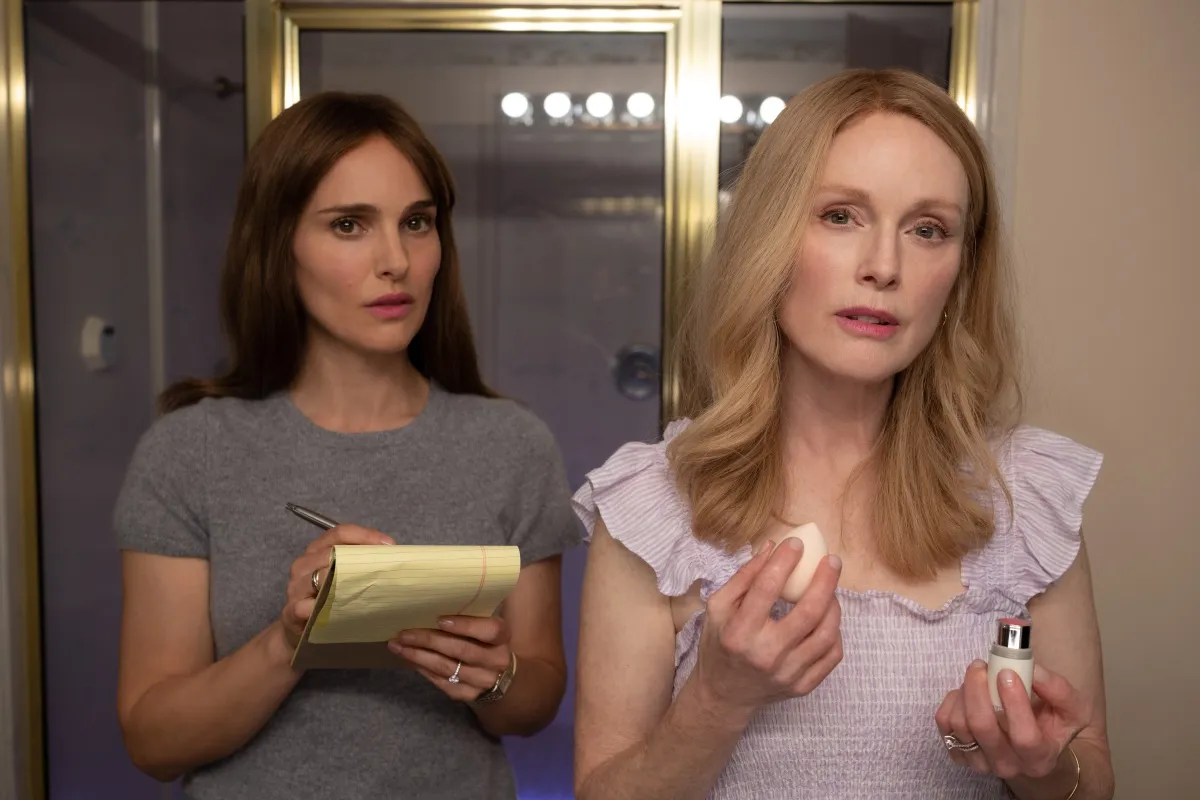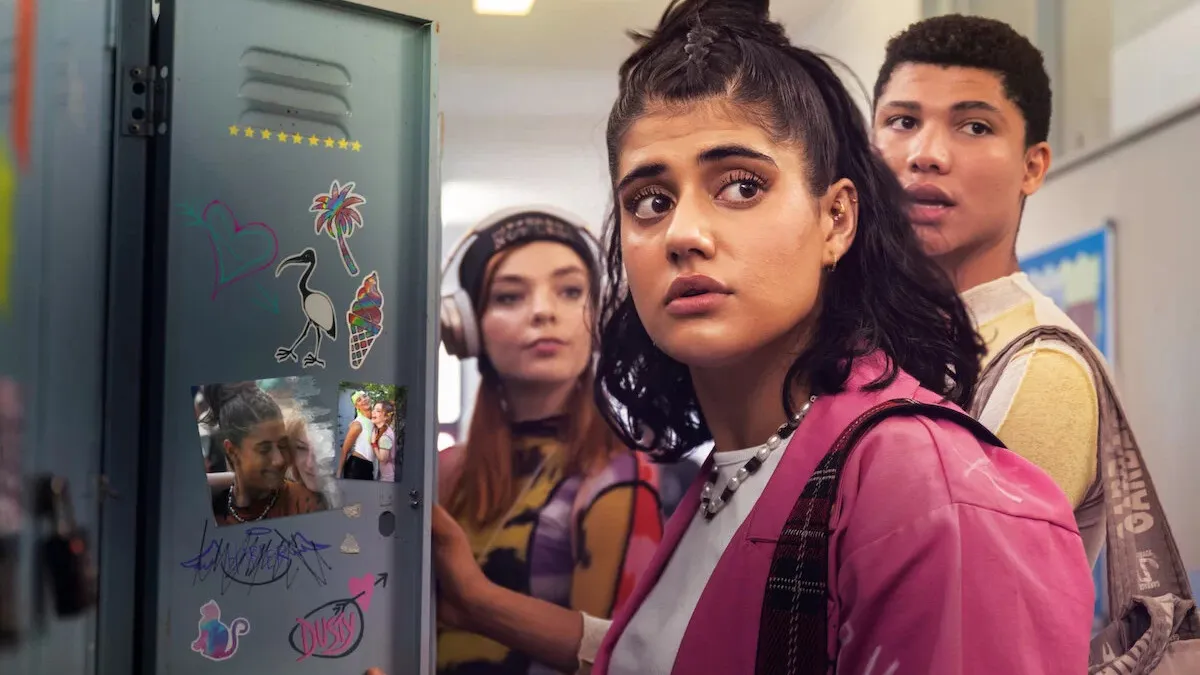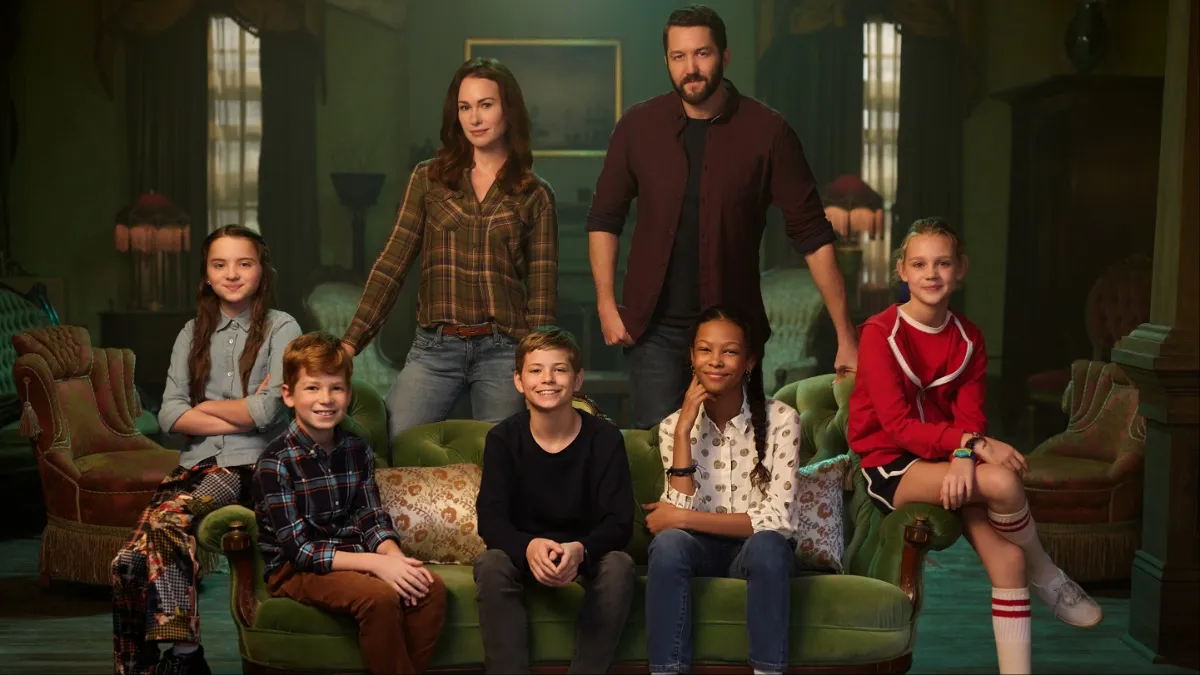May December, Todd Haynes’ new film loosely inspired by the true story of Mary Kay Letourneau, is punctuated by moments of disorientation that briefly bring the plot—about an actress who embeds herself with a woman who married the teen boy she abused—to a halt. Each new piece of information tilts the film on its axis, forcing both the characters and the viewer to readjust their perception.
Written by Samy Burch, May December is a masterful work of melodrama and unpretentious character study that opens a nesting doll of perspectives. There’s Gracie Atherton-Yoo (Julianne Moore), the woman who married and had children with the 13-year-old boy she was caught raping at the pet store where they worked. And Joe (Charles Melton), the former 13-year-old boy who in many ways remains a child, indefinitely stunted by the experience of coming of age in a relationship with his abuser. And then there’s Elizabeth (Natalie Portman), the star of a TV procedural who’s preparing to play Gracie in an upcoming film.
In the sense that Elizabeth is doing her homework, she’s a grating overachiever; not content with merely observing Gracie and her family, Elizabeth dissects her subjects as if pinning insects and removing their spindly legs, one by one. We’re never given to believe that Elizabeth is genuinely interested, as she claims, in Gracie’s psychology. Her curiosity is more sociopathic than salacious, as if—through carefully studied and rehearsed mimicry—Elizabeth can approximate genuine emotion in a convincing performance of humanity. May December also presents Elizabeth as a stand-in for the media at large and its predilection for mining traumatic details to cobble together a sensational narrative with easily identifiable heroes and villains.
But Gracie undermines Elizabeth’s attempts to perceive her at nearly every turn. This is most evident in scenes involving mirrors, which—not unlike the media—flatten and distort reality, creating a false sense of perception. What we see in a mirror is often misleading, which is why there’s often a cognitive dissonance when we look at ourselves in photos and attempt to reconcile that version of ourselves with the one we see in a reflection. Mirrors are crucial to how Elizabeth perceives Gracie; when the two women are in front of a mirror, they rarely look directly at one another, each interacting with the other’s reflection. Elizabeth can only see Gracie through a lens distorted by her own ideas about who or what Gracie is, and constantly searches for the information that will confirm her thesis.
Just as there are no perfect victims, there are no perfect abusers, either—which seems like an absurd thing to point out, but the media’s tendency to flatten complexities and reduce people to neat and tidy archetypes isn’t exclusive to one side or the other.
Played with remarkable precision by Julianne Moore, Gracie is a destabilizing force who is only consistent in her ability to constantly upend assumptions about who she is as both an actual person and a character in the narrative Elizabeth is constructing. In two of the most jarring moments in May December, Gracie disorients Elizabeth—and the viewer—by expressing a level of self-awareness that refutes simple characterization. Following a celebratory family dinner, during which Gracie body-shames her youngest daughter (not for the first time) in a performance of overbearing middle-class motherhood that belies her own obsessions with image and control, Gracie and Elizabeth find themselves in front of another mirror. Elizabeth asks how Gracie expected the evening to go, to which Gracie replies, “That tonight would go well. That my children would love me. And my life would be perfect.” Elizabeth scoffs and says, “That’s a little naive.” And Gracie delivers another disorienting line: “I am naive.”
When you go looking for something, you’re apt to find it. Which is why, in one of May December‘s best scenes, Elizabeth so readily accepts an explanation of sorts for Gracie’s behavior from her son, Georgie (Cory Michael Smith in a revelatory performance). It’s obvious that Georgie, who was friends with Joe in school, has been fundamentally affected by his mother’s choices. He has a recognizable but ineffable quality of a person you might encounter in passing—at a bar, at some party—who is unselfconscious and impulsive in a way that feels dangerous. But after the aforementioned dinner, Georgie offers Elizabeth exactly what she’s been looking for in her conversations with those closest to Gracie when he explains that his mother was sexually abused by her older brothers. “That explains a lot,” says Elizabeth as she visibly reorients herself to this new information.
As viewers, we accept Georgie’s proffered narrative, too, because it’s easier to believe than the alternative—that Gracie is, like everyone else, the sum of her environment, her upbringing, and her personal choices; that Gracie is, like everyone else, a complicated person who sometimes contradicts herself; that Gracie is, ultimately, like everyone else.
Does Gracie’s supposed childhood trauma make her rape and prolonged grooming of Joe more comprehensible? Similar revelations did nothing to humanize Mary Kay Letourneau in the ‘90s. In April 1998, the Los Angeles Times published a story about Letourneau, who was then serving a seven-and-a-half year prison sentence while pregnant with the second of two children she had with her former sixth-grade student, Vili Fualaau. In the article, journalist Pamela Warrick writes of two traumatic incidents from Letourneau’s past: the tragic death of her three-year-old brother, who drowned in the family’s swimming pool while Letourneau and another brother played nearby; and the shocking revelation that Letourneau’s father, ultra-conservative politician John G. Schmitz, was carrying on a long-term affair with one of his former college students, who was pregnant with their second child.
Julia Moore, the psychiatrist who conducted a pre-trial evaluation of Letourneau and diagnosed her with bipolar disorder, told the Los Angeles Times, “There is no question that her brother’s death, combined with other traumas Mary Kay suffered later, contributed to the tragedy of her life today.” In his reporting on Letourneau in the June 1998 issue of SPIN magazine, journalist Matthew Stadler elaborates on additional mitigating factors: Letourneau’s mother, Mary, was a public figure in the anti-feminist crusade against the Equal Rights Amendment, and fought to prevent her children from learning about sexual health in school. According to court documents reviewed by SPIN, Letourneau told a therapist that she had a “periodic sexual relationship” with one of her brothers when they were children. (This latter admission doesn’t appear to be mentioned in other reports from the time, which makes May December‘s inclusion of a similar allegation even more compelling.)
Yet these details were often elided in news and tabloid reports about Letourneau, which followed her throughout her incarceration and continued long after—until her eventual separation from Fualaau and her death in 2020 following a battle with cancer. Would it have made much of a difference if the media consistently reminded the public of Letourneau’s own tragic past? It seems more likely that the information would have only served to help categorize her in a binary in which abusers are either those who were abused themselves and unable to successfully process the trauma, or complete sociopaths whose crimes beget an infamous mononym.
It also positions Letourneau in an overly simplistic victim binary, in which abused people either become survivors who have conquered the painful lingering effects of trauma, or become abusers themselves. There is no space for Vili Fualaau or for May December‘s Joe in this conception of abuse.

Like Gracie’s performance of suburban middle-class normalcy, warts and all, Joe’s stoicism allows Elizabeth and the viewer to underestimate his intelligence. Charles Melton transcends a pitiful reading of the character, and his measured delivery—combined with Joe’s hobby of finding and nurturing Monarch chrysalises in cages in the couple’s home—encourages a more patient view of a man in arrested development. Questions take shape that haunt May December, and still linger over his real-life counterpart. Pedophiles are exclusively interested in prepubescent children, while those clinically defined as ephebophiles and hebephiles are interested in adolescents and teens. Neither are typically interested in sex with appropriately aged adults, nor do they maintain long-term relationships with their victims. So why did Gracie—and by extension, Letourneau—stay with her victim?
Those questions give rise to one of the film’s most powerful scenes, in which Joe confronts Gracie about the beginning of their relationship. As critic Louis Peitzman points out, the scene mirrors a deeply uncomfortable exchange between Vili Fualaau and Mary Kay Letourneau in a TV interview. When Joe, who has now fathered three children, including a now-teen boy, questions whether a 13-year-old boy was capable of pursuing and engaging in a sexual relationship with a woman in her thirties, Gracie’s response offers a much-needed glimpse at a previously unseen dynamic. The scene begins with Gracie in bed and Joe sitting in a chair across the room, but Gracie urges him to join her on the bed, reasserting her control. “You seduced me,” she insists. When Joe says, “But I was 13 years old,” Gracie begins badgering him with the refrain, “Who was in charge?”
Melton plays this devastating moment of realization like a sudden gasp of air, a desperate hand breaking the surface of something that has been forcibly submerged for decades. It doesn’t feel like the first time they’ve had this conversation. As May December reaches its conclusion, it becomes increasingly clear that Gracie is more shrewd than either we or Elizabeth could have anticipated. In their final exchange, Gracie casually informs Elizabeth that Georgie’s story about childhood sexual abuse was a lie, a gambit by a troubled son in need of attention.
“Insecure people are very dangerous, aren’t they” Gracie says, and, echoing their previous exchange in the bathroom, adds, “I’m secure.” By now it seems entirely plausible that Gracie chose to maintain a relationship with Joe in an act of self-preservation.
When Letourneau pleaded guilty to rape in 1997, her lawyer David Gehrke told SPIN that she would only agree to do so if the charge was for rape in the second degree. “That would keep her sentence below 96 months and make her eligible for the treatment programs,” said Gehrke, referring to an intensive course of treatment that was designed and, up until that point, only utilized for male sex offenders. Letourneau also wanted to avoid making Fualaau take the stand, but this seems like a lesser concern given the media frenzy that followed.
Gehrke recounted the influx of media requests and offers his office received following Letourneau’s guilty plea, including offers from studios hoping to explore “Mary’s story” in a movie. “As a legal tactic we wanted some coverage to humanize this ‘child rapist,’ to show this is a real person with real concerns and feelings,” Gehrke explained. After serving three months in prison, Letourneau was released and almost immediately broke the terms of her reduced sentence by rekindling her relationship with Fualaau. It wasn’t long before the pair were caught having sex and Letourneau was ordered back to prison, this time for seven and a half years. A friend of the couple told SPIN that one of Letourneau’s attorneys “actually encouraged these reunions in the hopes of triggering a violation and rearrest” and attracting better press and film offers. “[Letourneau’s] story, her friendship—Letourneau herself—had become redeemable,” Stadler concluded, “a currency it seemed everyone wanted a piece of.”
The scene that precipitates Joe’s confrontation of Gracie finds the former in bed with Elizabeth, who has taken her invasive acting method to its inevitable, horrible conclusion by having sex with Joe. Afterward, Elizabeth assumes a condescending posture, telling Joe that he can and should leave Gracie. “Your responsibility, ultimately, is to yourself,” she says. “Gracie…,” Joe begins and trails off, and we’re left to wonder if he’s invoking his wife’s name to defend her or because Elizabeth has finally delivered a convincing performance.
“You’re gonna do what you’re gonna do,” Elizabeth says, scoffing, “but stories like these…” At this, Joe interrupts. “This isn’t a story,” he says. “This is my fucking life.” It’s a pointed reminder to Elizabeth, to the viewer, and to a media that commodifies and makes a spectacle of trauma. To this end, Elizabeth’s confident grasp of the material ultimately proves flimsy when she’s disoriented yet again by Gracie’s self-awareness. (In the punchline that is the final scene of May December, Elizabeth struggles to deliver a performance as Gracie, lost under a shitty blonde wig on the set of her movie.)
We are naturally inclined to categorize and narrativize the world around us, an instinct that holds especially true for that which defies our own sense of logic and morality. It’s a cliché that endures for a reason: stories are how we make sense of the world. When “stories like these” are reflected in the media’s lens, the intricate details are flattened for easier consumption. With each subsequent retelling, complicated, painful, and highly personal experiences lose fidelity.
They get lost in their own reflection.
(featured image: Netflix)









